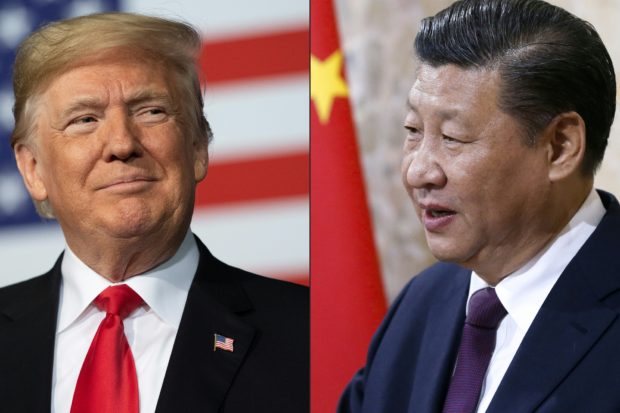WASHINGTON — President Donald Trump warned Thursday the United States had the option to separate from China’s deeply intertwined economy, despite the powers’ pledges to move forward on a trade deal.

This combination of pictures created on May 14, 2020 shows recent portraits of
China’s President Xi Jinping (R) and US President Donald Trump. Photos by Jim WATSON and PETER KLAUNZER / various sources / AFP
Tensions have been mounting between Beijing and Washington on a number of fronts including trade, although the two sides signed a “phase one” deal earlier this year to bring a truce to a bruising trade war.
The US “certainly does maintain a policy option, under various conditions, of a complete decoupling from China. Thank you!” Trump tweeted.
The US president wrote that he was responding to comments by his trade representative Robert Lighthizer, who has been at the forefront of trade negotiations with Beijing.
Lighthizer told a congressional committee this week that China so far has been living up to the terms of a “phase one” agreement that eased the dispute, but that decoupling the two economic giants was now impossible.
“That was a policy option years ago, but I don’t think it’s a policy or reasonable policy option at this point,” Lighthizer said.
Lighthizer described himself as a hardliner on China policy, and outlined the Trump administration’s plans to “reset” the World Trade Organization, largely so that it can better rein in Beijing’s policies, which he says run afoul of free trade rules.
But his admission that the world’s two largest economies are inextricably linked — despite Trump’s aggressive campaign to push American firms to relocate production to the United States — caused some angst in Republican circles.
On Friday, Chinese foreign ministry spokesman Zhao Lijian told a regular press briefing that “trying to artificially cut global industrial and supply chains, and using political power to change the laws of the economy, is neither realistic nor wise”.
“This cannot solve the US’ problems and will only cause ordinary Americans more harm,” he added.
Secretary of State Mike Pompeo said a senior Chinese official also confirmed to him Beijing’s commitment to phase one, which includes China stepping up purchases of US products.
Pompeo met Wednesday in Hawaii with Yang Jiechi, a veteran maker of Chinese foreign policy, in Hawaii to discuss soaring tensions.
Besides trade, the United States has sharply criticized China over its handling of the coronavirus pandemic, an upcoming security law in Hong Kong and its mass detention of Uighurs and other mostly Muslim minorities in the northwestern Xinjiang region.
Senior US diplomat David Stilwell, who accompanied Pompeo, said the United States insisted on a “more reciprocal” relationship but declined to discuss the discussions in depth.
“Whether or not they were productive or not, I will look at what comes up in the next couple of weeks. You’ll see a reduction in aggressive behavior or not,” Stilwell told reporters.
“If they come to the table with a reasonable proposal, the US is obviously going to treat it reasonably and look for ways to work toward a positive outcome.”